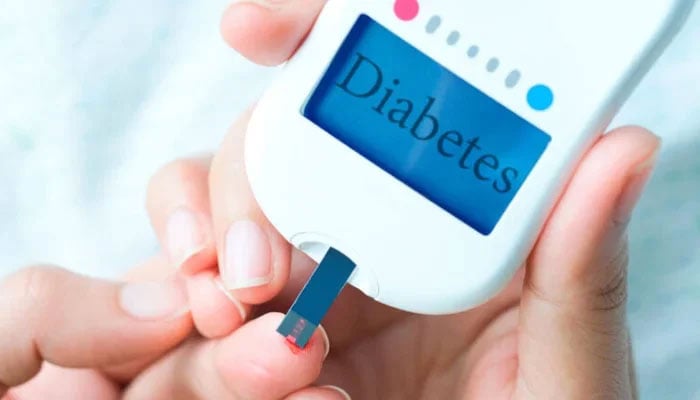‘Pakistan on way to have 62m diabetics’
Islamabad:The number of people living with diabetes in Pakistan increased from 6.3 million in 2011 to 33 million in 2021 and approximately 36 million in 2024, with an additional one million as pre diabetic while Pakistan is set on way to having 62 million diabetics by 2045.
The sharp surge in the number of patients with diabetes has ranked Pakistan number one country globally in terms of prevalence rate of the disease where almost every third adult Pakistani is diabetic. More than 1100 deaths are attributed to diabetes or its complications daily in Pakistan. If no immediate policy action is taken, the situation will further deteriorate.
This was stated by representatives of civil society organizations during a walk organized jointly by Pakistan National Heart Association (PANAH), Heartfile, Pakistan Youth Change Advocates, Centre for Peace and Development Initiative and others in front of National Press Club Islamabad on world diabetes day observed on Thursday.
Experts agree that the consumption of ultra-processed foods lurking with industrially produced Trans fats, sugar and salt are major contributing factors to the diabetes surge in Pakistan. Trans fats, found in processed foods, fried items, and baked goods, are known to increase insulin resistance, raise bad cholesterol (LDL), and promote inflammation - all of which increase the risk of type 2 diabetes and cardiovascular disease.
Munawar Hussain, Country Coordinator for Global Health Advocacy Incubator (GHAI) said that sweet drinks are the biggest source of sugar intake in the diet. The liquid sugar alters the metabolism of the body, promotes excess calorie intake which leads to type 2 diabetes and many other fatal diseases. Several research studies indicate that consumption of sugary drinks has a clear link with type 2 diabetes. The regular consumption of sweet drinks may increase the risk of type 2 diabetes by 30 per cent. Due to the negative health effects of ultra-processed foods and beverage products, several countries have taken effective policy measures to reduce their consumption. These measures include increasing excise taxes on these products and enactment of front of pack labelling and warning signs to guide consumers for making healthier food choices, and limiting industrially trans fats to two per cent of the total fats in all food sources.
Sana Ullah Ghumman, General Secretary PANAH said that higher taxes on sugary drinks prove to be an effective strategy for reducing the prevalence of diabetes and other fatal non-communicable diseases. This approach has been successfully adopted by approximately 50 countries, including Bahrain, Morocco, Oman, Saudi Arabia, the United Arab Emirates, and Qatar. The outcomes of these measures have shown promising results in significantly decreasing the consumption of sugary drinks and lowering the prevalence of diabetes in these countries, he said.
Dr. Saba CEO Heartfile stressed the importance of curbing SSB consumption to combat diabetes. "The link between sugar-sweetened beverages and diabetes is well-documented. As a medical doctor, I can see how excessive sugar intake contributes to the rise of NCDs. Raising excise taxes on all types of sweetened drinks is an evidence based strategy to reduce its consumption and cut down diabetes."
Huma Jehangir, Media Officer Pakistan Youth Change Initiative (PYCA) emphasized on uniform regulations and stated, "The masses are exposed to ultra-processed products more than ever before." She emphasized on urgent policy action by the government at regulatory and legislative level.
'World Diabetes Day' is a crucial opportunity to raise awareness about the link between industrially produced trans fats and the rising rates of diabetes in Pakistan, said Mukhtar Ahmed Ali, Executive Director of CPDI. "Trans fats are a significant contributor to this crisis, and it is a must that we should eliminate them from our food system."
-
 Pentagon Threatens To Cut Ties With Anthropic Over AI Safeguards Dispute
Pentagon Threatens To Cut Ties With Anthropic Over AI Safeguards Dispute -
 Meghan Markle's Father Shares Fresh Health Update
Meghan Markle's Father Shares Fresh Health Update -
 Travis Kelce Takes Hilarious Jab At Taylor Swift In Valentine’s Day Post
Travis Kelce Takes Hilarious Jab At Taylor Swift In Valentine’s Day Post -
 NASA Confirms Arrival Of SpaceX Crew-12 Astronauts At The International Space Station
NASA Confirms Arrival Of SpaceX Crew-12 Astronauts At The International Space Station -
 Can AI Bully Humans? Bot Publicly Criticises Engineer After Code Rejection
Can AI Bully Humans? Bot Publicly Criticises Engineer After Code Rejection -
 Search For Savannah Guthrie’s Abducted Mom Enters Unthinkable Phase
Search For Savannah Guthrie’s Abducted Mom Enters Unthinkable Phase -
 Imagine Dragons Star, Dan Reynolds Recalls 'frustrating' Diagnosis
Imagine Dragons Star, Dan Reynolds Recalls 'frustrating' Diagnosis -
 Steve Jobs Once Called Google Over Single Shade Of Yellow: Here’s Why
Steve Jobs Once Called Google Over Single Shade Of Yellow: Here’s Why -
 Barack Obama Addresses UFO Mystery: Aliens Are ‘real’ But Debunks Area 51 Conspiracy Theories
Barack Obama Addresses UFO Mystery: Aliens Are ‘real’ But Debunks Area 51 Conspiracy Theories -
 Selma Blair Explains Why Multiple Sclerosis 'isn't So Scary'
Selma Blair Explains Why Multiple Sclerosis 'isn't So Scary' -
 Will Smith Surprises Wife Jada Pinkett With Unusual Gift On Valentine's Day
Will Smith Surprises Wife Jada Pinkett With Unusual Gift On Valentine's Day -
 Shamed Andrew Has Paid Royal Favours With ‘national Scandal’
Shamed Andrew Has Paid Royal Favours With ‘national Scandal’ -
 Prince William Ticked Off By How Andrew ‘behaved With Staff’
Prince William Ticked Off By How Andrew ‘behaved With Staff’ -
 Prince William Questions Himself ‘what’s The Point’ After Saudi Trip
Prince William Questions Himself ‘what’s The Point’ After Saudi Trip -
 James Van Der Beek's Friends Helped Fund Ranch Purchase Before His Death At 48
James Van Der Beek's Friends Helped Fund Ranch Purchase Before His Death At 48 -
 King Charles ‘very Much’ Wants Andrew To Testify At US Congress
King Charles ‘very Much’ Wants Andrew To Testify At US Congress




